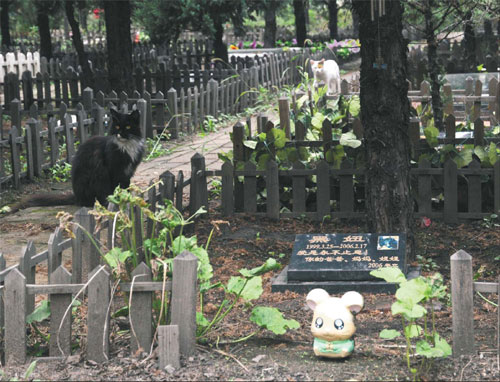Heavenly pets
Updated: 2012-09-13 09:37
By Wang Kaihao, Xu Lin (China Daily)
|
|||||||||||
 |
|
Fewer than 200 pet animals are buried at Bo'ai Companion Animal Burial Service Center in Beijing. Photos by Xu Lin / China Daily |
More pet owners want to give their animals a dignified burial. Wang Kaihao and Xu Lin check out the options in Beijing.
Related: Who let the dogs out?
Since 2008, 43-year-old Bai Yusheng has been visiting a cemetery along the North Sixth Ring Road in Beijing's Changping district at least twice a year, to clean the tombs of his two beloved cats. "It's just like what one would do for deceased relatives," Bai says. "Whenever I pass by the cemetery, I will visit them. I update them about my life and reminisce about our happy times," he says. His cats are buried in the Bo'ai Companion Animal Burial Service Center, which was established to safely handle dead pets during the SARS outbreak in 2003. It's also the capital's first officially registered pet crematory.
The center, with a capacity of more than 600 animals, has sold less than 200 tombs so far. Each tomb, measuring 3 square meters, costs 2,500 yuan ($395), and comes with a tree in the compound.
Bai considers the price affordable, as it also covers a burial ceremony similar to that for human beings.
The center, with an area of nearly 1.67 hectares, not only provides animal cremation and a cemetery, it is now home to 100 stray cats and 20 dogs.
It costs 500 yuan to cremate a pet of 20 kg and below, and 800 yuan for animals weighing more than 20 kg. The center also provides a door-to-door service to pick up pet owners who require its services, for a fee.
"SARS was a special case that led to the opening of the center. But since then, there hasn't been any cause that calls for the set up of similar institutions," says founder Wang Pingxi, who is also head of Beijing Protection Association of Small Animals.
According to the center's general manager, Liao Yumin, cats and dogs make up the majority of the animals they cremate, with other animals such as rabbits and turtles.
"Most of our customers come to us out of love for their pets, which used to bring them a lot of joy. Some customers don't want the ashes. They choose cremation to protect the environment," Liao says.
"I've heard various touching stories about the relationship between human beings and their pets. Many treat their pets like family members and want to give them a proper burial. One woman even flew from abroad to plan her dog's funeral."
According to Qi Qinghua, head of Beijing-based Wangkang Animal Hospital, there are not many channels to handle animal remains. He only knows of five pet crematories in Beijing.
He says having pets was banned in China before the 1980s, and has only begun to gain popularity since 2000. So there are many aged animals.
"The ratio of infectious diseases has decreased in recent years and two thirds of my animal patients suffer from old-age infirmities. I have prepared cinerary caskets in hospitals, just in case," Qi says.
Related Stories
Furry, four-legged pals, this way please 2012-08-16 09:23
Who let the dogs out? 2012-08-16 09:19
George Clooney treats dog to spa day 2012-06-28 08:57
Huge choice for pet owners to pick from 2011-09-10 15:41
Pet trade's four Ps: prim, proper, profitable pampering 2011-09-10 15:41
Today's Top News
Rescuers race against time for quake victims
Telecom workers restore links
Coal mine blast kills 18 in Jilin
Intl scholarship puts China on the map
More bird flu patients discharged
Gold loses sheen, but still a safe bet
US 'turns blind eye to human rights'
Telecom workers restore links
Hot Topics
Lunar probe , China growth forecasts, Emission rules get tougher, China seen through 'colored lens', International board,
Editor's Picks

|

|

|

|

|

|





